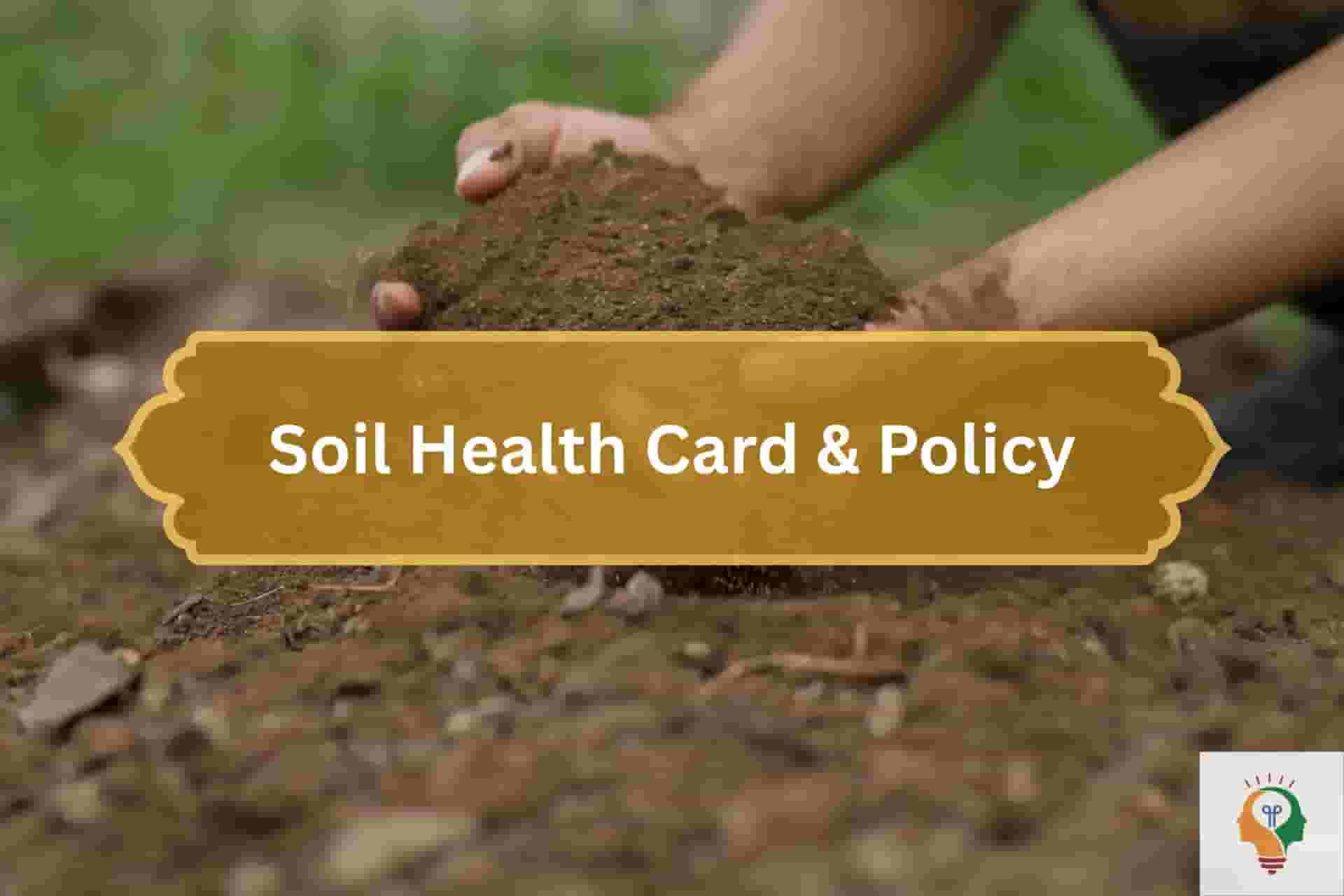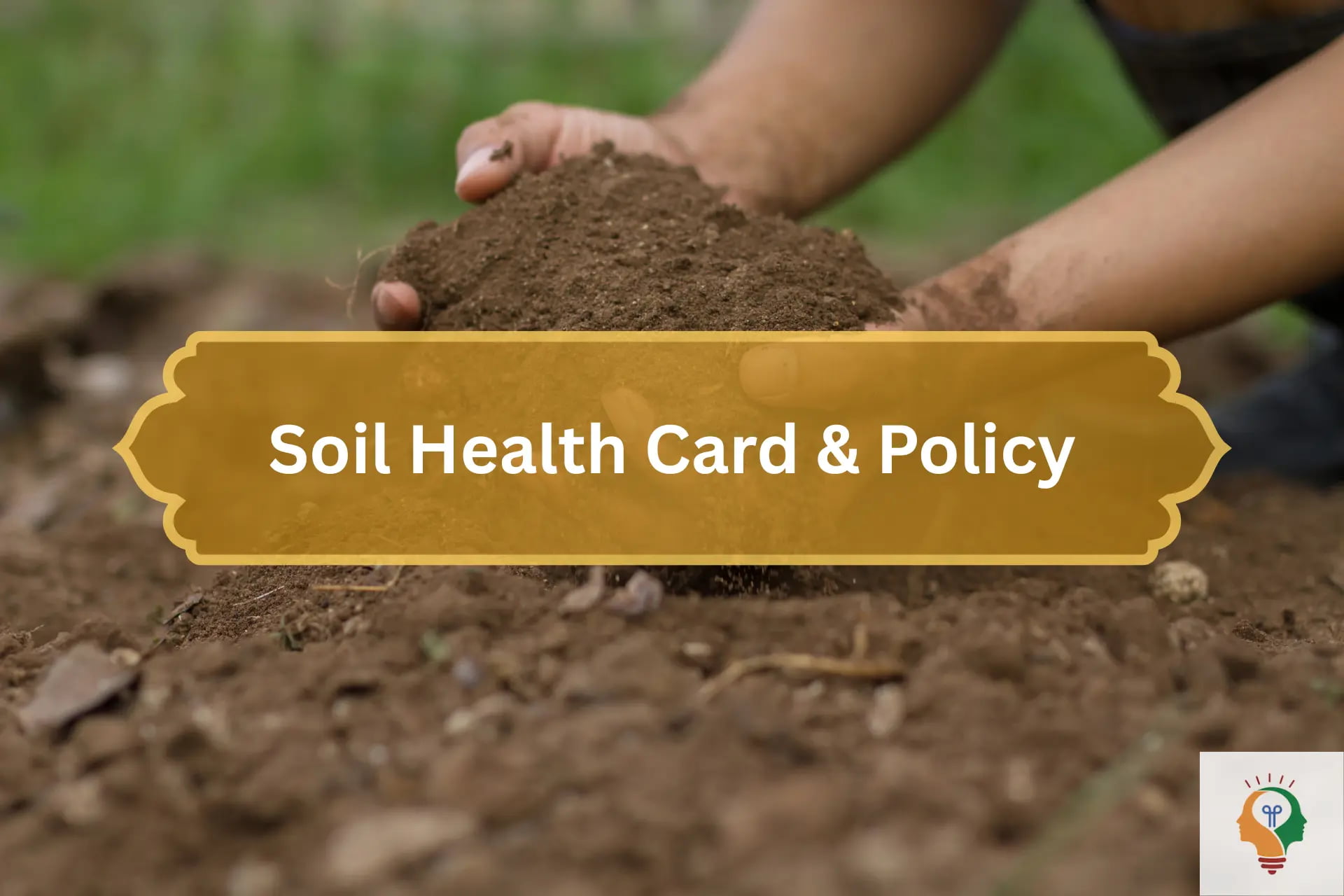Soil Health Cards & Policy: RKVY, Fertility, Agriculture & Farmer Scheme
Updated: 17-12-2025 at 3:30 PM
1k


In 2015, the Government of India launched the Soil Health Card (SHC) scheme as a major agricultural reform to promote sustainable farming practices. The scheme provides farmers with scientific information about the nutritional status of their soil and recommends crop-wise fertiliser usage to correct nutrient imbalances. The Soil Health Card scheme helps farmers make informed decisions, improve productivity, and maintain long-term soil fertility.
The Soil Health Card Scheme PDF and digital tools now allow farmers to easily understand soil test results and advisory recommendations without depending solely on local inputs.
Overview
The table below highlights the key points of the Soil Health Card Policy:-
| Name of the scheme | Soil Health Card Policy |
|---|---|
| Launched by | Government of India |
| Soil Health Card scheme launched in which State | Overall states in India |
| Launched in | 2015 |
| Objective | To provide farmers with detailed information about the soil of their lands |
| Target group | For all small and marginal farmers of India |
| Soil testing | Every 2 years |
| Digital Access | Soil Health Card website, Soil Health Card portal, Soil Health Card app |
What Is The Soil Health Card Policy?
The Soil Health Card Policy is a central government initiative aimed at improving soil quality across India. Through scientific soil testing, farmers receive detailed reports covering essential Soil health Card parameters such as nitrogen, phosphorus, potassium, organic carbon, and pH levels.
This farmer-focused policy supports sustainable agriculture and food security. Farmers can now access their cards digitally through the Soil Health Card portal or download the Soil Health Card Scheme PDF for offline use.
Read more: Atmanirbhar Oilseeds Abhiyan
What Was The Need For The Soil Health Card Policy?
Soils in India have been exposed to intense cultivation and over-exploitation, and their fertility has declined drastically. According to the Indian Council of Agricultural Research, about 120 million hectares of land in India are affected by soil degradation, and nutrient depletion is one of the main disasters.
Farmers, most of the time, use a blanket approach concerning the application of fertilisers. Due to this, the supply of most of the requisite nutrients is not balanced, leading to deficiencies of certain nutrients or toxicities.
Furthermore, the continued climate changes have caused erratic patterns in rainfall, leading to prolonged droughts and untimely rains, including other catastrophic implications of extreme weather conditions. As such, all the key stakeholders must start the Soil Health Card scheme to mitigate these multi-task challenges.
Read more: Ayushman Card
Key Features
Several features of the Soil Health Card policy outline its goals. Some of the major features of the govt scheme are:
-
Soil health cards: Farmers receive their Soil health cards that comprise information about the land they own, like the nutrient content of the soil of their land.
-
Soil testing: Government officials periodically test the soil’s content every 2 years to keep track of the soil’s health.
-
Recommendations for fertiliser: Under the government. policy, tailored recommendations on fertiliser are given based on soil testing, so that they can improve the soil’s health.
-
Free testing: The policy provides free or subsidised soil testing for farmers so that they can work on their soil’s health, as well as digital access through the Soil Health Card app and Soil Health Card website.
-
Boost in productivity: The scheme aims to boost the productivity of farmers’ lands by improving the health of the soil on their land.
Farmers can also obtain a Soil Health Card PDF free Download from official portals after testing.
Also read: e-GOPALA App
Key Details On The Soil Health Card
A Soil Health Card parameter is issued by the government of India as an official document that comprises information about the soil of a land, like the soil’s nutrient status, health, etc. The card was launched to promote agricultural productivity and an overall boost to the agriculture sector.
The Soil Health Card comprises certain important information or components listed below in brief:
-
Details of the farmer: The card consists of the name of the farmer, the address of the farm, and the identity number of the farmer.
-
Health status of the soil: Details about the soil’s nutrient profile, pH value, and other such technical details.
-
Fertiliser recommendation: The ideal type of fertiliser for the soil is also mentioned in the card.
-
Crop recommendation: The ideal type of crop that would be perfect for the soil is also mentioned in the card.
-
Validity: The card mentions the validity period of the soil health test as well which is done every 2 years.
States like the Soil Health Card Haryana have shown strong implementation and farmer participation, serving as a model for other regions.
Also read: Kera Suraksha Insurance Scheme
Benefits
The Soil Health Card Scheme PDF has various benefits for farmers and the agriculture sector.
Environmental Benefits
This soil health card policy offers another significant advantage. The policy ensures that, through precise information about soil health, farmers are better equipped to understand what their particular soil requires and the correct dosages of fertilisers they should be using. This helps reduce the excessive use of chemical fertilisers, which causes soil degradation and environmental.
Especially in the less agricultural regions irrigated by rainfall, water scarcity can be a bottleneck. Effective nutrient management practices also promote ecological balance and biodiversity in agroecosystems.
Economic Benefits
It has significant economic impacts under the Soil Health Card Policy, as it helps farmers reduce their input costs and increase their crop yields.
The farmers will use the right kind of fertiliser and soil amendments in the right quantity as per the recommendations given in the soil health cards, which would result in prudent use of resources and thereby reduce input costs. In addition, the policy will generate employment opportunities in soil testing laboratories and related sectors, which will also contribute to the growth of the rural economy.
Social Benefits
As part of this process, farmers will participate in soil health assessments and discussions with other farmers about their own experiences.
Read more: eShram Card
Eligibility Criteria
Interested farmers first need to ensure whether they fit into the eligibility criteria for Soil Health Card. The eligibility criteria are as follows:
-
Farmers must be small and marginal.
-
The land should be used for agricultural work.
Read more: Aadhaar Card
Documents Needed
Applicants need to submit certain supporting documents to successfully apply for the scheme. The list of documents is as follows:
-
Identity proof, such as Aadhaar card, Voter ID
-
Land ownership proof
Also read: Latest MSP Reform
How To Apply The Soil Health Card?
Farmers often ask how to apply soil health card. Follow these steps and register yourself under this central government scheme for farmers.
Step 1: Registration
Farmers must apply for the SHC scheme at the portal or the regional agricultural office. One can also register through mobile apps or community-based organisations. You need to provide details about your farmland.
Step 2: Collect a Soil Sample
Upon registration, an agriculture extension officer visits the field for soil sample collection.
Step 3: Soil Testing
After soil samples are collected, they are sent to soil testing laboratories. These laboratories test soil samples to ensure reproducibility and accuracy.
Step 4: Generate a Soil Health Card
You will then receive your soil health card with information on the strengths and weaknesses of the soil.
Step 5: Distribution, Delivery, and Advisory Services
The soil health cards are distributed locally, online, and through community centres. SMS and mobile apps are also available for soil health cards. In addition to providing information to farmers, the SHCs also provide advisory-based training for adhering to recommended practices.
Note: Farmers can complete Soil Health Card online registration through the official Soil Health Card portal, mobile apps, or local agriculture offices.
How To Download Soil Health Cards?
Applicants can download their Soil Health Cards by following certain steps mentioned below:
-
Step 1: Visit the official SHC website and log in through the Soil Health Card portal.
-
Step 2: Navigate to the ‘Download Soil Health Card’ option from the citizen services.
-
Step 3: Enter your application number or Aadhar number.
-
Step 4:Click on Soil Health Card PDF free Download.
Other Government Schemes For Ensuring Soil Health
There are various other government schemes like the soil health card (SHC) policy. Some of the other major schemes are:
-
National Soil Health Mission (NSHM): The mission aims to promote sustainable soil management practices to boost the productivity of the land.
-
National Mission for Sustainable Agriculture: The govt program aims to improve soil health by using sustainable farming practices.
-
Pradhan Mantri Krishi Sinchai Yojana: The govt scheme aims to promote mindful water usage to enhance the moisture content of the soil.
Many farmers also enquire about the Soil Health Card scheme launched in which State, and it was initially rolled out nationally with pilot implementations across multiple states.
Conclusion
The Soil Health Card Policy is a foundational initiative that strengthens Indian agriculture by encouraging scientific soil management and informed farming practices. By enabling farmers to understand Soil Health Card parameters such as nutrient levels, pH value, and organic carbon, the scheme helps reduce unnecessary fertiliser use, lower cultivation costs, and improve crop productivity.
With facilities like Soil Health Card online registration, access through the Soil Health Card portal, and digital services via the Soil Health Card app, the scheme has become more accessible and farmer-friendly. Overall, the Soil Health Card scheme plays a crucial role in promoting sustainable agriculture, protecting the environment, and ensuring long-term food security in India.
Stay updated with Jaagruk Bharat to get the latest information on government healthcare schemes and more, and reach out to us via our community page if you have any questions.
Frequently Asked Questions
0
0
1k
0
0
1k Views
0
No comments available





Our Company
Home
About
T&C
Privacy Policy
Eula
Disclaimer Policy
Code of Ethics
Contact Us
Careers
Cancellation & Refund Policy
Categories
Women
Insurance
Finance
Tax
Travel
Transport & Infrastructure
Food
Entertainment
Communication
Government ID Cards
E-commerce
Traffic guidelines
Miscellaneous
Housing and Sanitation
Sports
Startup
Environment and Safety
Education
Agriculture
Social cause
Employment
Disclaimer: Jaagruk Bharat is a private organization offering support for documentation and government scheme access. We are not affiliated with any government body. Official services are available on respective government portals. Our goal is to make processes easier and more accessible for citizens.
All Copyrights are reserved by Jaagruk Bharat